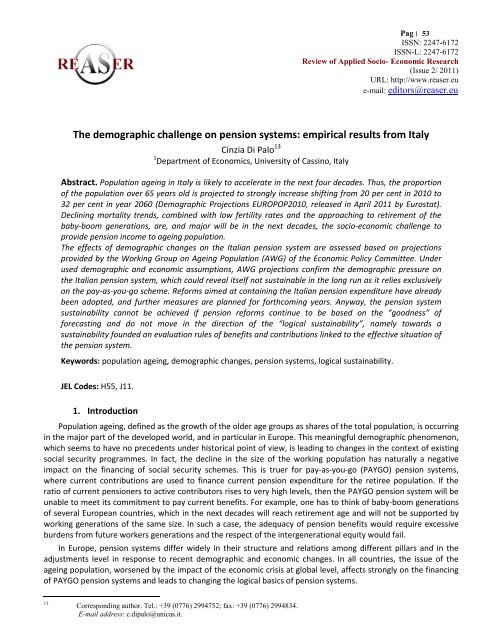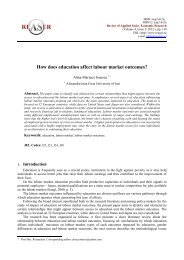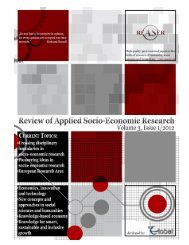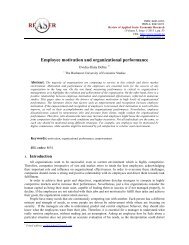Volume 2, ISSUE2/2011 - Review of Applied Socio-Economic ...
Volume 2, ISSUE2/2011 - Review of Applied Socio-Economic ...
Volume 2, ISSUE2/2011 - Review of Applied Socio-Economic ...
You also want an ePaper? Increase the reach of your titles
YUMPU automatically turns print PDFs into web optimized ePapers that Google loves.
Pag׀ 53 ISSN: 2247-6172ISSN-L: 2247-6172<strong>Review</strong> <strong>of</strong> <strong>Applied</strong> <strong>Socio</strong>- <strong>Economic</strong> Research(Issue 2/ <strong>2011</strong>)URL: http://www.reaser.eue-mail: editors@reaser.euThe demographic challenge on pension systems: empirical results from ItalyCinzia Di Palo 131 Department <strong>of</strong> <strong>Economic</strong>s, University <strong>of</strong> Cassino, ItalyAbstract. Population ageing in Italy is likely to accelerate in the next four decades. Thus, the proportion<strong>of</strong> the population over 65 years old is projected to strongly increase shifting from 20 per cent in 2010 to32 per cent in year 2060 (Demographic Projections EUROPOP2010, released in April <strong>2011</strong> by Eurostat).Declining mortality trends, combined with low fertility rates and the approaching to retirement <strong>of</strong> thebaby-boom generations, are, and major will be in the next decades, the socio-economic challenge toprovide pension income to ageing population.The effects <strong>of</strong> demographic changes on the Italian pension system are assessed based on projectionsprovided by the Working Group on Ageing Population (AWG) <strong>of</strong> the <strong>Economic</strong> Policy Committee. Underused demographic and economic assumptions, AWG projections confirm the demographic pressure onthe Italian pension system, which could reveal itself not sustainable in the long run as it relies exclusivelyon the pay-as-you-go scheme. Reforms aimed at containing the Italian pension expenditure have alreadybeen adopted, and further measures are planned for forthcoming years. Anyway, the pension systemsustainability cannot be achieved if pension reforms continue to be based on the “goodness” <strong>of</strong>forecasting and do not move in the direction <strong>of</strong> the “logical sustainability”, namely towards asustainability founded on evaluation rules <strong>of</strong> benefits and contributions linked to the effective situation <strong>of</strong>the pension system.Keywords: population ageing, demographic changes, pension systems, logical sustainability.JEL Codes: H55, J11.1. IntroductionPopulation ageing, defined as the growth <strong>of</strong> the older age groups as shares <strong>of</strong> the total population, is occurringin the major part <strong>of</strong> the developed world, and in particular in Europe. This meaningful demographic phenomenon,which seems to have no precedents under historical point <strong>of</strong> view, is leading to changes in the context <strong>of</strong> existingsocial security programmes. In fact, the decline in the size <strong>of</strong> the working population has naturally a negativeimpact on the financing <strong>of</strong> social security schemes. This is truer for pay-as-you-go (PAYGO) pension systems,where current contributions are used to finance current pension expenditure for the retiree population. If theratio <strong>of</strong> current pensioners to active contributors rises to very high levels, then the PAYGO pension system will beunable to meet its commitment to pay current benefits. For example, one has to think <strong>of</strong> baby-boom generations<strong>of</strong> several European countries, which in the next decades will reach retirement age and will not be supported byworking generations <strong>of</strong> the same size. In such a case, the adequacy <strong>of</strong> pension benefits would require excessiveburdens from future workers generations and the respect <strong>of</strong> the intergenerational equity would fail.In Europe, pension systems differ widely in their structure and relations among different pillars and in theadjustments level in response to recent demographic and economic changes. In all countries, the issue <strong>of</strong> theageing population, worsened by the impact <strong>of</strong> the economic crisis at global level, affects strongly on the financing<strong>of</strong> PAYGO pension systems and leads to changing the logical basics <strong>of</strong> pension systems.13Corresponding author. Tel.: +39 (0776) 2994752; fax: +39 (0776) 2994834.E-mail address: c.dipalo@unicas.it.








